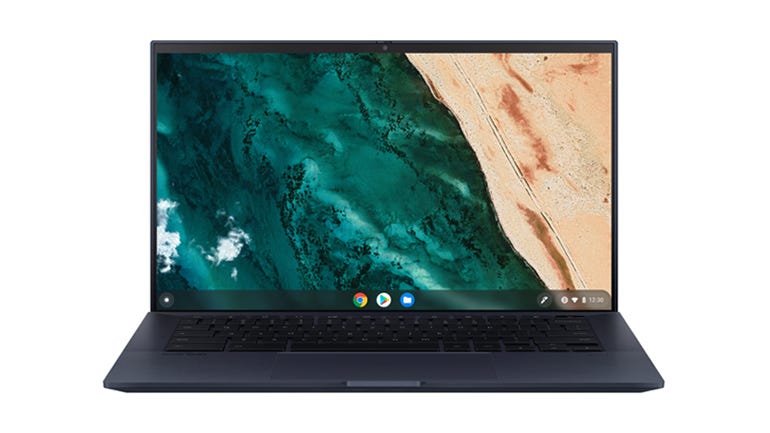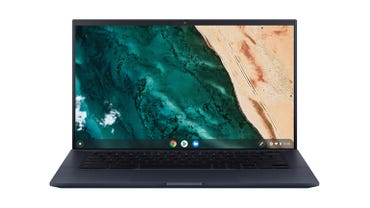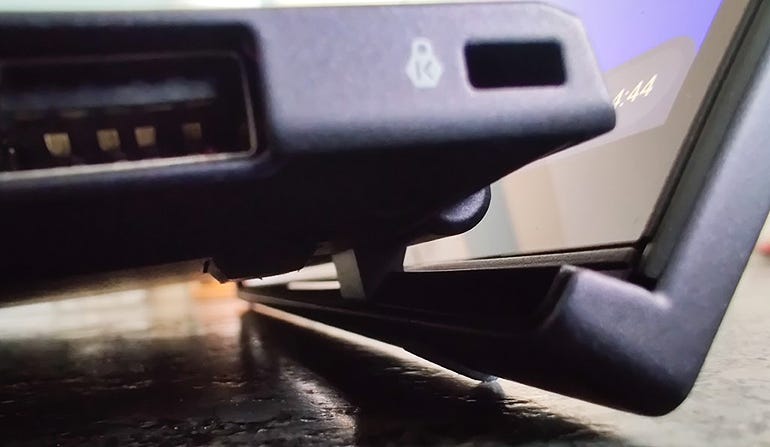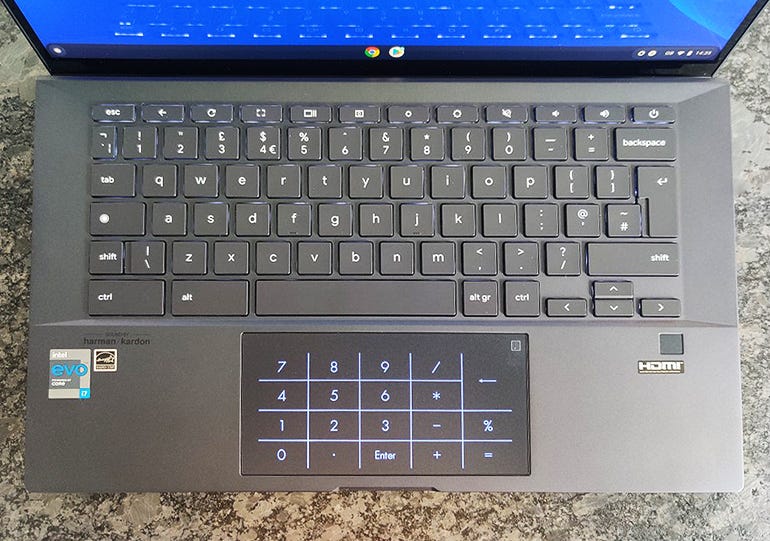Asus Chromebook CX9 review: A capable but pricey business Chromebook

Asus Chromebook CX9: 14-inch FHD or 4K touch screen, 8GB or 16GB of RAM, 128GB or 256GB of SSD storage.
Image: Asus
Chromebooks have come a long way since they were introduced as low-cost devices designed for students or those that simply didn’t want the cost and hassle of a full Windows or MacOS-based computer. It wasn’t too long before business/professional users came into the frame, and today there are several Chromebook choices aimed at office-based and hybrid workers.
The 14-inch Asus Chromebook CX9 is one of these, and with a price of £1,099.99 in the UK for a Core i7-based model (FHD, 16GB RAM, 512GB SSD) it’s at the top end of the Chromebook price range.
In the US, the Chromebook CX9 starts at $749.99 for a Core i3 model (FHD, 8GB/128GB), rising to $1,249.99 for a Core i7 system with a 4K screen (16GB/512GB).
At these prices, especially at the high end, the Chromebook CX9 needs to be excellent in every respect to rival Windows or MacOS options.

Like
- Attractive design, solid build
- Plenty of ports
- Good keyboard
- Useful ErgoLift hinge
Don’t Like
- Poor speakers
- Average battery life
- Core i7 models are expensive
First impressions are entirely positive. This is a small, light, neat-looking laptop that can rival the best of the current crop of ultraportable PCs in this respect. The dark grey chassis should fit unobtrusively into even the most traditional offices. The Chromebook marque is present on the lid, but it’s quite discreet. The chassis has a nice, tactile finish to the top and bottom.
The Chromebook CX9 has a desktop footprint of 32.22cm wide by 20.49cm deep, and is 1.80cm thick (12.69in. x 8.07in. x 0.71in.). The weight of 1.15kg (2.54lbs) is comparable to the lightest of ultraportable PCs.
The 45W USB-C charger is also small and light, and shouldn’t be a problem to carry on your travels. You can use any other USB-C charger you have to hand, and if you plug in a standard low-power phone charger the charge window alerts you to this fact, and you can drip-feed the battery. Similarly, the CX9’s charger can be used on your phone, and if the phone supports rapid charging then you can take advantage.
The chassis is made from magnesium alloy, and both the lid and base sections are tough. The Asus Chromebook CX9 has been built to meet the military-grade MIL-STD 810H, and to add further protection Asus provides a sleeve into which it can be placed for storage or when bagged up for travel.
On opening, the keyboard raises up thanks to the Asus ErgoLift hinge mechanism. This pushes the long lower edge of the lid section downwards towards the desk, lifting up the base section. There are two consequences: the keyboard sits at a slight angle, which some people (including me) find more comfortable; lowering the screen also means some of the bottom bezel is hidden, making for a more immersive overall user experience.

Asus’s ErgoLift hinge raises the keyboard by around three degrees, providing a comfortable typing angle.
Image: Sandra Vogel / ZDNet
The 14-inch screen’s bezels are reasonably small. From the edge of the screen to the outside edge of the chassis I measured the short edge bezels at 6mm and the long top edge bezel at 10mm. The bottom bezel is more usefully measured to the inner edge of the casing, and this is also 10mm. Asus quotes a screen to body ratio of 92%, although our calculation puts it considerably lower (81.8%).
There is a 720p webcam in the upper bezel. A sliding mechanism drops a red cover across the lens, making it easy to see when the camera’s view is blocked.
The FHD (1,920 x 1,080, 157.3ppi) LCD panel is sharp, bright and touch-sensitive, with maximum brightness of 400 nits. The panel’s glossy finish isn’t great for mainstream productivity workloads, but it does suit video viewing. If you can get past the glossiness, the screen’s 16:9 aspect ratio is good for having two working document windows open side by side.
A pair of Harman Kardon speakers deliver disappointing sound quality, light on bass with far too much treble.
The backlit keyboard is great to type on. Large, well-spaced keys with 1.5mm of travel have good downward resistance and a nice, springy bounce-back. The double-height Enter key is a little narrow, but it’s not a big issue. The wrist rest is rather shallow and incorporates a fingerprint sensor on its right side.
The touchpad is wide and very responsive. Tap its upper right corner and a number pad pops up — the cursor remains usable even when the number pad is active. While it might not be needed very often, this is a very clever use of the touchpad space.

The backlit, spill-resistant keyboard is a comfortable typing platform; a tap in the top right corner of the touchpad brings up a number pad.
Image: Sandra Vogel / ZDNet
My Asus Chromebook CX9 review unit was powered by an Intel Core i7-1165G7 processor with integrated Iris Xe Graphics, 16GB of RAM and a 512GB SSD. These are high-end specifications for a Chromebook, and I worked with upwards of 20 Chrome tabs alongside streaming music without so much as a stutter.
Asus has fitted the Chromebook CX9 out with a decent array of ports and connectors. There are two USB-C Thunderbolt 4 ports, one of which will be occupied during charging, a USB 3.2 Type-A port, a full size HDMI connector, a 3.5mm headset jack and a MicroSD card reader.
SEE: Best Windows laptop 2022: Top notebooks compared
Asus says the Chromebook CX9’s 3-cell 50Wh battery will keep it going for up to 14 hours. However, that doesn’t tally with my real-world experience. I set the Asus Chromebook CX9 up for my usual workload, using Chrome to open a number of tabs and web apps, writing directly into apps, and streaming media. Under this regime, a three-hour work session depleted the battery from full to 43%, suggesting battery life of around 5.3 hours.
Charging is pretty nippy when a power boost is required. With the battery at 31%, 15 minutes of charging took it to 49%, a further 15 minutes saw it rise to 68%, and after 45 minutes of charging the battery was at 84%.
Conclusions
The Asus Chromebook CX9 is a good-looking laptop with a tough chassis that meets MIL-STD 810H. The ErgoLift hinge works well and I appreciate the slightly raised keyboard it delivers, plus the fact that it blocks out some of the lower screen bezel. The keyboard is comfortable to type on, and I like the inclusion of a number pad in the trackpad. The screen is bright and touch-responsiveness is a plus. There’s also a good array of ports.
Set against that are poor speakers and battery life that won’t see many people through a working day. Arguably the Core i7 processor, 16GB of RAM and 512GB of on-board storage of our review unit are excessively specified, leading to a steep price ($1,149.99 in the US, £1,099.99 in the UK). Better value may well be had by lowering your sights and settling for the entry-level Core i3 model ($749.99 in the US).
RECENT AND RELATED CONTENT
HP Chromebook x2 11 review: A well-built but premium-priced tablet-first 2-in-1
Asus Chromebook Flip CX5 review: A sturdy 15.6-inch convertible Chromebook
Lenovo IdeaPad Duet Chromebook review: Affordable, functional and ultra-portable
Best Chromebook 2022: Top Chrome OS laptops
Best Chromebook deals available right now: Samsung, Acer, HP, and more
Read more reviews







